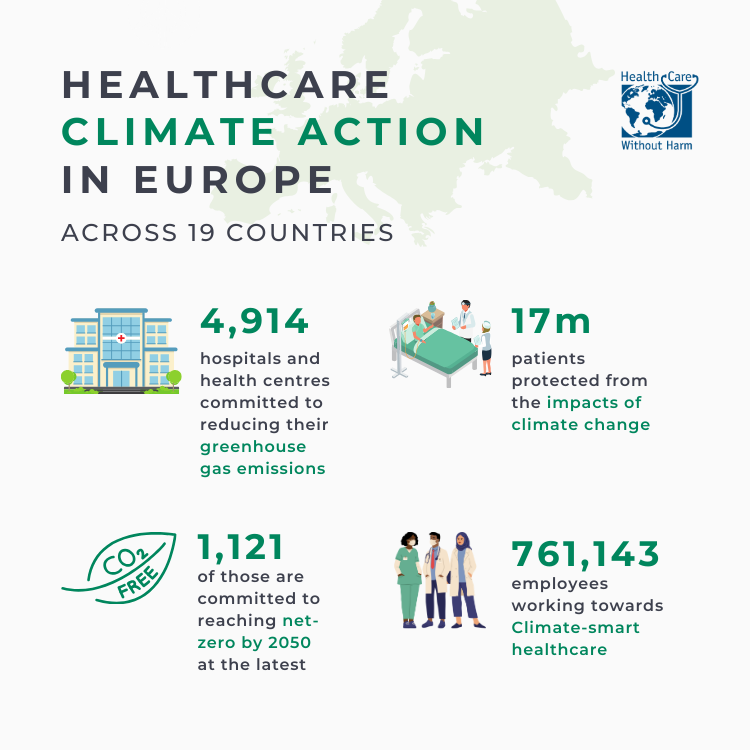Healthcare can help forge a future with healthy hospitals and healthy people by implementing transformative climate solutions that significantly lower climate-related risks and damage to ecosystems and biodiversity caused by global warming. The Race to Zero campaign, under the leadership of the UN Climate Change High Level Champions, unites healthcare leaders at the forefront of climate action.
Race to Zero is a pledge signed by more than 75 healthcare institutions, representing the interests of more than 14,000 hospitals and health centres in over 26 countries, aligning their emission reductions with the Paris Agreement. Pledging to reach net zero by 2050, and striving to limit warming to 1.5°C, significantly lowers climate risks and the costs of climate adaptation.
Health Care Without Harm is the official partner of Race to Zero for the healthcare sector.
Why join?
By joining Race to Zero, health care institutions receive membership in the Health Care Climate Challenge and Global Green and Healthy Hospitals network (if your institution is not already a member). Membership provides access to a suite of tools, resources and people to assist health care institutions in reducing their carbon footprint, implementing successful sustainability projects and programs, and achieving the ambition of Race to Zero.
Benefits of joining Race to Zero:
- Association with and recognition from the United Nations Framework Convention on Climate Change (UNFCCC) high-level climate champions
- Access to guidance, tools, resources, educational activities, and support provided by Health Care Without Harm
- Access to a global community of practice hosted in the GGHH network, alongside other healthcare institutions participating in the initiative
- Participation in the Health Care Climate Challenge, a global program of Health Care Without Harm that recognises and celebrates healthcare institutions worldwide for their progress and commitments
- Potential to share and promote case studies at future relevant events
- Access to toolkits and resources to develop a carbon management plan
Requirements to join
The requirements for healthcare institutions to participate in Race to Zero follow the "5 Ps criteria": pledge, plan, proceed, publish, and persuade.
- Pledge: Sign the Pledge and commit to reaching a (1) net zero target by 2050; and (2) an interim target which reflects maximum effort toward or beyond a fair share of the 50% global reduction in CO2 by 2030.
- Plan: Within 12 months, disclose a net zero action plan which outlines the key actions to be undertaken.
- Proceed: Take action through the available pathways toward achieving net zero, consistent with delivering your interim targets.
- Publish: Report progress against both interim and longer-term targets, as well as the actions being taken, at least annually.
- Persuade: Within 12 months of joining, align external policy and engagement, including membership in associations, to the goal of halving emissions by 2030 and reaching global (net) zero by 2050.
The requirements for healthcare institutions to participate in Race to Zero are based on the 2022 Race to Zero Expert Peer Review Group Interpretation Guide. Health Care Without Harm has summarised the requirements in the Interpretation Guide of Race to Zero Criteria for the Health Care Sector.
The Health Care Climate Challenge
By joining the Race to Zero, institutions join the Health Care Climate Challenge and are eligible for the Climate Challenge Awards.
The Health Care Climate Challenge is building a global coalition of healthcare institutions at the forefront of this transformation. The Climate Challenge has over 400 institutional participants, representing the interests of more than 26,000 hospitals and health centres in 49 countries.
An initiative of Health Care Without Harm, the Health Care Climate Challenge engages and equips healthcare institutions – from small clinics to large health systems to ministries of health – to commit to effective climate action while building collective impact across countries and across borders.
The Health Care Climate Challenge is based on three pillars:
- Mitigation: Prevent emissions by reducing healthcare's own climate footprint.
- Resilience: Assess climate risks and prepare for the impacts of extreme weather and the shifting burden of disease.
- Leadership: Educate staff and the public about climate and health and promote policies to protect public health from climate change.
Participating institutions submit data annually on the three pillars through the Hippocrates Data Centre and, once they have done so, become eligible for a Climate Challenge Award.

